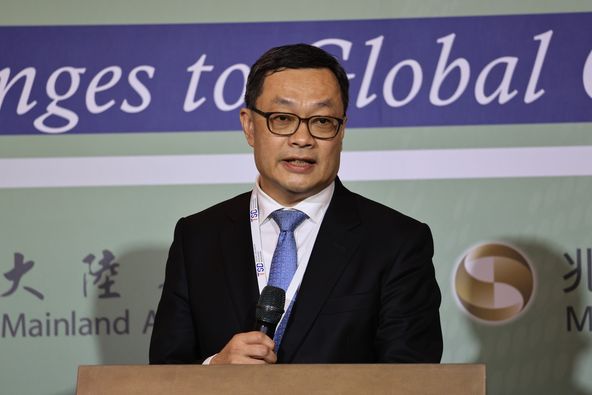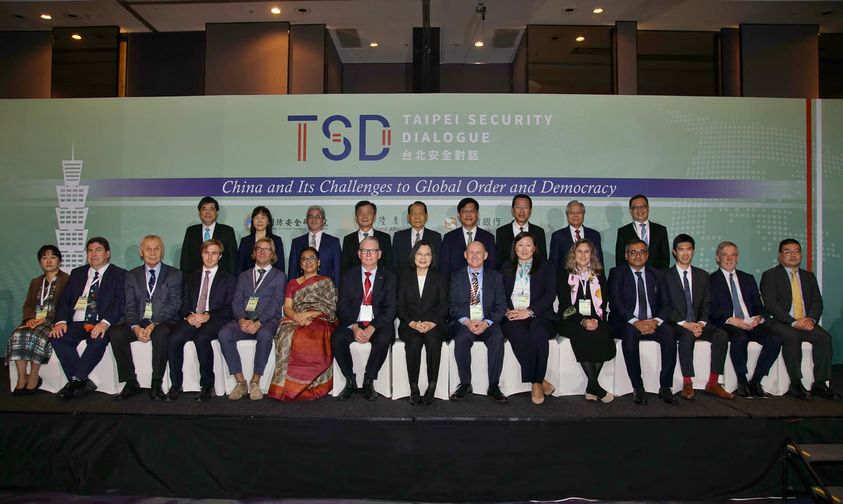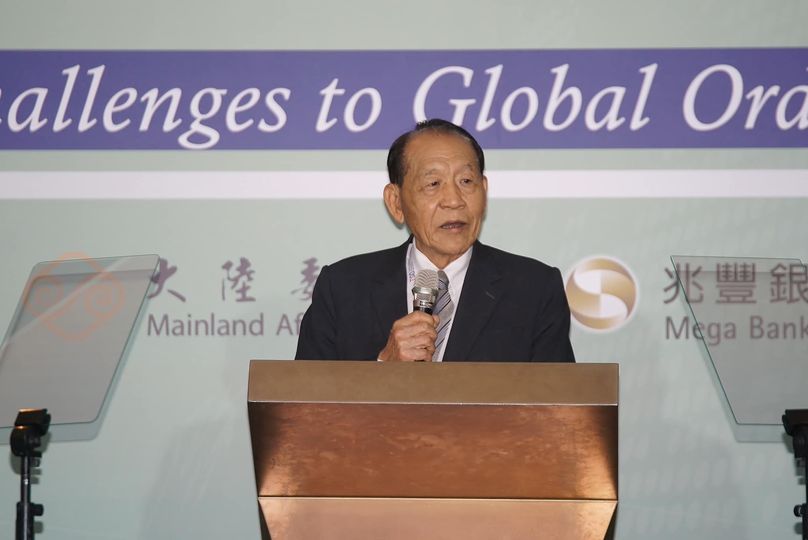Original text from: Nikkei Asia Review
CHRIS HORTON DECEMBER 27, 2018 04:22 JST
/https___s3-ap-northeast-1_amazonaws_com_psh-ex-ftnikkei-3937bb4_images_1_3_8_7_18507831-1-eng-GB_china-flag-and-digital-image-768x432.jpg)
“Chinese disinformation campaigns against Taiwan could be used as a blueprint against other democracies,” says Jessica Drun, a research analyst at SOS International in Washington © Reuters
TAIPEI — A growing number of voices inside and outside Taiwan are warning that China is becoming increasingly sophisticated in its attempts to influence democracy on the island.
This has major implications for Taiwan, which will hold presidential and legislative elections in January 2020. In late November it held local elections under a cloud of accusations by the government that online disinformation produced in China had undermined voters’ confidence in President Tsai Ing-wen and her Democratic Progressive Party. Tsai stepped down as party chairwoman after the DPP lost crucial mayoral elections to the China-friendly Kuomintang.
Given its geographic, linguistic and cultural proximity, China has long used Taiwan as a testing ground for its tools of influence before rolling them out to other countries. Analysts say that recent attempts to disrupt the island’s democracy are likely a prelude to similar attacks on other democracies, especially its main rival, the U.S.
At present, China has less ability to affect American politics than Russia, but by using Taiwan as a propaganda laboratory that could soon change, said Yi-Suo Tzeng, acting director of the Cyber Warfare and Information Security division at Taiwan’s Institute for National Defense and Security Research.
“As they accumulate knowledge and test their algorithms, I think within two years we will probably see China having the capability to use cybertools to intervene in the U.S. election,” Tzeng told the Nikkei Asian Review. Although he described Beijing’s current approach to exercising political influence in the U.S. as “old-school,” Tzeng said Beijing is improving quickly.
On Dec. 13, six sitting U.S. senators, including former Republican presidential candidates Marco Rubio and Ted Cruz, sent a letter to officials including Secretary of State Mike Pompeo and Treasury Secretary Steven Mnuchin urging a U.S. investigation of alleged Chinese attempts to influence Taiwan’s elections last month. They cited concerns for other democracies around the world.
In a report published before the local elections, Jessica Drun, a research analyst at SOS International in Washington, cataloged signs that China was becoming more adept at influencing Taiwanese social media. Drun’s findings included one instance of fake news connected to a Chinese IP address that may have prompted the suicide of a Taiwanese diplomat in Japan. She noted that the results of the hundreds of races decided in Taiwan would help China tweak its methods in the future.
/https___s3-ap-northeast-1_amazonaws_com_psh-ex-ftnikkei-3937bb4_images__aliases_articleimage_5_7_9_1_18501975-1-eng-GB_RTS27AND-768x512.jpg)
Supporters of Kaohsiung mayoral candidate Han Kuo-yu celebrate his election win last month. Han was among a number of candidates from the China-friendly Kuomintang to claim victory. © Reuters
“Chinese disinformation campaigns against Taiwan could be used as a blueprint against other democracies, particularly in sowing greater discord between segments of the population,” Drun said.
“While any attempt against the United States would likely require a greater degree of sophistication, China has demonstrated a familiarity with popular Western social media networks, as well as an awareness of existing vulnerabilities within these systems, as brought to light in the 2016 U.S. elections.”
Taiwan’s Justice Ministry announced in October that it was investigating 33 cases where Taiwanese candidates were allegedly funded by Beijing.
China denies that it attempts to influence Taiwan’s democracy. “We have never interfered with Taiwan’s elections,” Ma Xiaoguang, spokesman for China’s Taiwan Affairs Office, told reporters on Oct. 31.
But it has intervened in the past. As the island prepared for its first presidential election in 1996, Beijing made it clear that it did not want the eventual victor, Lee Teng-hui, to win, going as far as firing missiles into Taiwanese waters to underscore its point.
When the DPP won the presidency and control of the legislature in 2016 — ending Kuomintang rule on the island since it arrived following Japan’s surrender in 1945 — many observers noted that Chinese President Xi Jinping’s decision to meet with then-Taiwanese President Ma Ying-jeou months before the election was an attempt by Beijing to burnish the Kuomintang’s image.
In the run-up to Taiwan’s recent local elections Beijing used a combination of tactics to keep Tsai and the DPP on the defensive. These include vast amounts of disinformation created by Chinese content farms, disruption of online debates by Chinese hackers and trolls, hacking of DPP social media accounts and government websites, and inflation of the popularity of Kuomintang candidates across online, broadcast and print media, according to a recent article published by the University of Nottingham’s Taiwan Insight.
Some of China’s efforts to sway Taiwanese media are open, others take place behind the scenes.
In 2012, thousands of journalists and free-speech activists took to Taiwan’s streets to protest the purchases of media outlets by Taiwanese tycoons with massive investments in China. Tsai Eng Meng of the Want Want China Holdings conglomerate, went so far as to declare that the China Times newspaper he bought would be used to promote Taiwan’s unification with China — a position that appeals to only a small portion of Taiwanese.
Much of Taiwan’s media lean toward being China-sympathetic, but an even larger portion — wittingly or not — helps spread Chinese disinformation, according to a report released this year by Oxford University and the Reuters Institute. Much of this disinformation comes from Chinese military social media accounts, whose claims are rebroadcast or reprinted without proper verification, the report said.
In recent years, China has gotten better at inserting its views into American media. Inserts from the state-owned China Daily are included in publications including The New York Times, The Wall Street Journal and The Los Angeles Times. Politico has entered into a content sharing partnership with the South China Morning Post, whose editorial line has become increasingly Beijing-friendly.
As well as attacking the DPP, China does what it can to boost the Kuomintang, which outperformed expectations in November’s local elections by winning mayoral races in three key cities: New Taipei, Taichung and Kaohsiung. All three winners have declared their support for the so-called 1992 Consensus, which posits that China and Taiwan are part of the same country, with different interpretations on either side of the Taiwan Strait.
/https___s3-ap-northeast-1_amazonaws_com_psh-ex-ftnikkei-3937bb4_images__aliases_articleimage_7_7_0_2_18502077-1-eng-GB_RTS27AFN-3-768x512.jpg)
Taiwan President Tsai Ing-wen announces her resignation as chairwoman of the Democratic Progressive Party after heavy defeats in November’s local elections. © Reuters
Chen Yonglin, a former Chinese diplomat who defected in Australia in 2005, said that compromising current and former politicians and local media were major parts of Beijing’s strategy toward democracies. This year, several Australian political figures with financial ties to China have found themselves at the center of a Chinese influence debate for parroting Beijing’s talking points on the South China Sea and other issues.
In order to advance Beijing’s goals, “you don’t have to say the CCP is great, you just have to say the CCP is OK,” Chen said of the Chinese Communist Party in an interview with the Nikkei Asian Review. Chen singled out Taiwan’s former President Ma and former Vice President Lien Chan, both of the Kuomintang, as being useful tools in China’s influence campaign.
Ma made headlines in Taiwan and China before the November elections when he advocated a “three noes” policy — no ruling out unification with China, no support for Taiwan’s independence and no use of force against China. Tsai blasted her predecessor, saying that his words conveyed the message that intimidation of Taiwan was working.
Tsai faces the fight of her political life ahead of presidential and legislative elections in January 2020.
Weakened by local election losses, she is likely to face a barrage of criticism from Beijing and its proxies. Observers are looking to her annual New Year’s Eve address for an indication of how she plans to woo Taiwanese voters, and push back against Chinese propaganda.
Analysts say China’s practitioners of political warfare have gained not only a deeper understanding of Taiwan’s culture and society, but also its democracy. The more these actors understand how democracy works in general, the more they can adjust their methods for use elsewhere.
As China’s push to sway international opinion come under increasing scrutiny especially among the Five Eyes countries — Australia, New Zealand, Canada, the U.K. and the U.S. — these countries and others are seeking to learn from Taiwan, according to several Taiwanese officials. Over the past year, organizations and government departments held events in Taipei to discuss China’s assault on open societies, attracting journalists, analysts and officials from abroad.
Taiwan foreign minister Joseph Wu, in a recent interview with Nikkei, said Taiwan is on the front line of China’s influence operations. “Taiwan has a lot of experiences in this regard, and we are willing to share,” Wu said.




